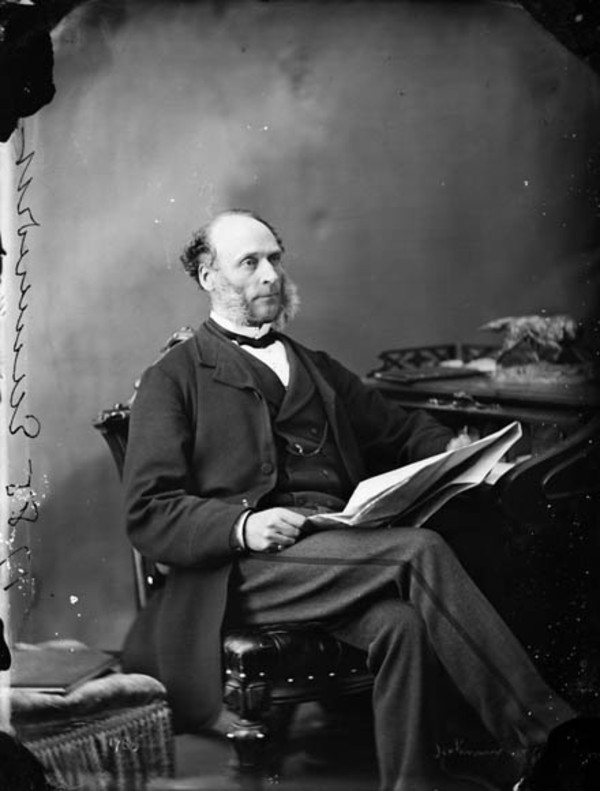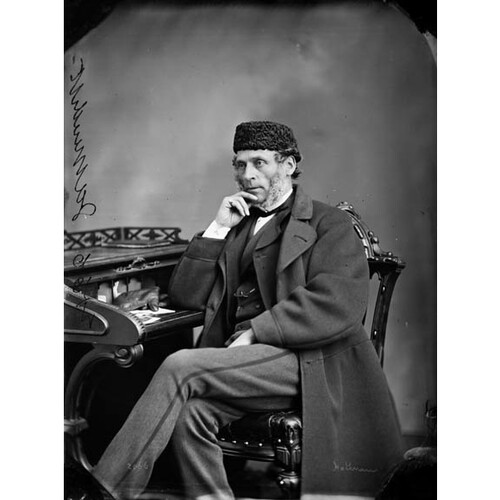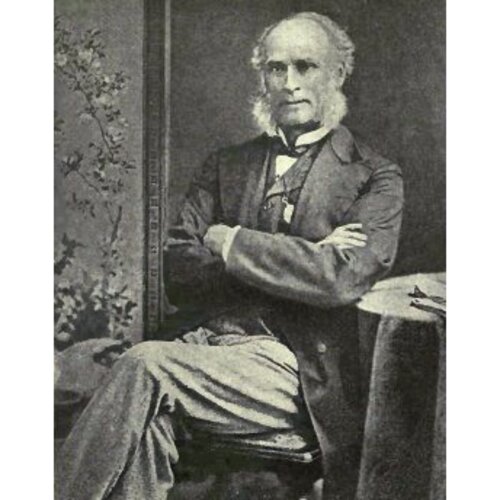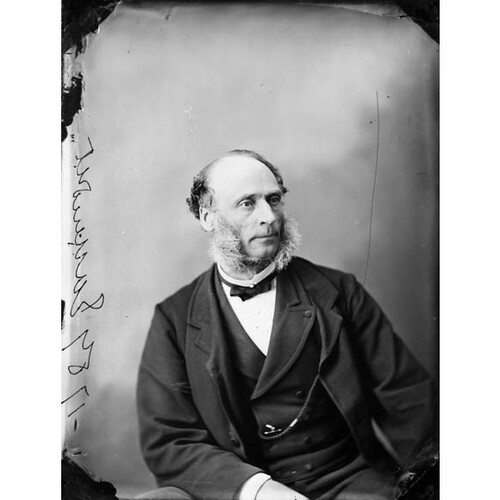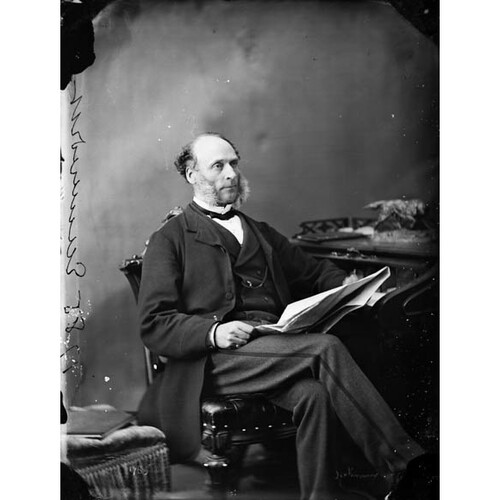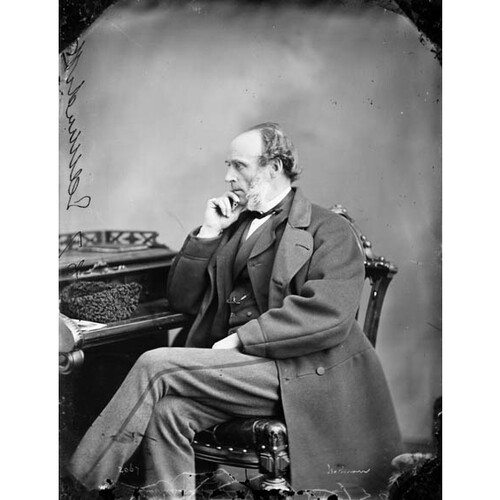MEREDITH, EDMUND ALLEN, office holder; b. 7 Oct. 1817 in Ardtrea, County Tyrone (Northern Ireland), son of the Reverend Thomas Meredith; m. 17 July 1851 Anne Frances Jarvis, and they had eight children; d. 12 Jan. 1899 in Toronto.
A member of a respectable Anglo-Irish family, Edmund Allen Meredith had a lonely and unsettled childhood which may have marked his nature for life. His father died when he was two, and his mother, soon married to another clergyman, emigrated to Montreal, leaving behind only Edmund, her youngest, and her eldest son, already in holy orders. Edmund lived with an elderly unmarried uncle who sent him at age nine to boarding-school at Castleknock near Dublin; at age sixteen he entered Trinity College where he won a classical scholarship and prizes in political economy and science. He received his ba in 1837; in 1842 he rejoined other members of his family in the Canadas, living first in Toronto and then in Montreal. Called to the bar in 1844, he did not practise law. At first he aspired to a college appointment in Toronto but instead, perhaps through the influence of his brother William Collis, a lawyer in Lower Canada and later chief justice at Quebec, he was appointed in 1846 to the unpaid and part-time position of principal of McGill College. After a year there fortune smiled in the form of a civil service plum. He joined the civil service of the United Province of Canada on 20 May 1847 at a salary of $2,600.
Although well fitted for this work and eminently good at it, Meredith sometimes chafed under what he regarded as inadequate remuneration and lack of recognition. On the face of it, he could hardly have been more successful. He had rank, prestige, and an entrée to the inner circles of the Canadian political and social élites. What he lacked, however, evidently hurt: real power and wealth. Many aspects of his civil service career await further study of the departments he served, but the main outlines are clear. As assistant provincial secretary for two decades, he dealt efficiently with a wide range of matters, many of them purely routine in nature, and, while he may have derived some pleasure from the very variety of concerns which made the department a clearing-house of government activities, he could hardly have enjoyed the mess of local and municipal business and routine approvals which often constituted sheer drudgery. In this period the fulfilment in Meredith’s life was derived from a marvellously happy marriage and from a professional sideline, membership on the Board of Inspectors of Prisons, Asylums and Public Charities, which led to a lifelong passionate interest in correctional and charitable work, especially prison reform.
Anne Frances Jarvis, known as Fanny, the eldest of three daughters of William Botsford Jarvis*, sheriff of the Home District, had first met her future husband as a child of 13 when he appeared in 1843 at the family’s Rosedale home with a letter of introduction to the sheriff. The courtship became serious five years later: they were married in 1851. The beautiful, delightful, and high-spirited Fanny had lived a charmed existence as the pampered child of Toronto’s gentry, partying and riding. By all rights Fanny, as historian Sandra Gwyn tells us in her captivating study of the Meredith family, should have married a dashing officer from a smart regiment and Edmund a bluestocking suited to the reflective life of a somewhat diffident civil servant. But Edmund, 13 years her senior, just under six feet in height, handsome and elegant, swept her off her feet; he gave her a lifetime of love and of devotion. Numerous entries in his diary provide poignant testimony. In 1864, for instance, on their 13th anniversary he confided that “I love her more than I ever did before, and all her letters to me are full of the most perfect love and longing.”
The early years of marriage, spent in Quebec City, temporarily Canada’s capital, were enhanced by social pleasures – dinners, balls, the winter carnival, all enlivened by the British officers stationed there – which made Toronto society pale by comparison. In 1865 Meredith and his colleagues undertook an enforced trek to the dreaded “sub-arctic lumbering town” chosen by Queen Victoria as the new Canadian capital. “The more I see of Ottawa, the more do I dislike and detest it,” reads a diary entry of 17 Nov. 1865; this distaste endured for years, fuelled by mud, rats, housing difficulties, servant problems, and divers other domestic and climatic miseries.
Confederation in 1867 brought a measure of professional disappointment. Not only did Meredith lose his cherished place on the prisons board but he regarded his new federal position, under-secretary of state for the provinces, as dull and offering little scope. In 1868 he made a determined, although unsuccessful, effort to win a remunerative post in Toronto. The tedium was relieved in 1869, however, when rebellion in the northwest placed Meredith’s department at the centre of events. He was not displeased at the discomfiture of William McDougall*, his former minister at Quebec, by the problems in Rupert’s Land; he vastly preferred working with his current superior, the charming Joseph Howe*, whom he described as “Old Man Eloquent . . . a most lovable man. . . . We ne’er shall look upon his like again.” Matters soon settled down to their usual routine, at which point Meredith, beset by money worries, launched his second campaign for a more remunerative job out of Ottawa, as secretary for the proposed Pacific railway. This time he relied on his close friendship with Sandford Fleming*, with whom he shared a fascination for standard time. Once again, perhaps fortunately, his hopes were balked, by an uncooperative Sir John A. Macdonald. Worse was to come. In the summer of 1873 he became deputy minister of the new Department of the Interior with Alexander Campbell as the first minister. The department assumed a wide range of responsibilities, including the Indian affairs branch and the dominion lands branch, but Meredith was loath at this stage in his career to take on burdensome new responsibilities Still, Meredith and Campbell quickly developed a high regard for each other’s abilities, and Meredith as deputy apparently achieved a far-reaching restructuring of the Indian affairs and the lands branches. When the Liberals led by Alexander Mackenzie came into power in November 1873, Meredith contributed to the ideal of a non-partisan civil service by serving them loyally and well. The Liberals sorely needed the experience and professional expertise of the man who was recognized for his mastery of both the detail and the substance of government business, and who was generally viewed as the best legislative draftsman in Ottawa.
Meredith’s diary for this period again offers behind the scenes insights into high politics and politics not so high. Alexander Campbell, for example, was sharply critical of John A.’s behaviour in 1873 during his last days in power. “He said that had Sir John A kept straight during the last fortnight the Ministry would not have been defeated.” Meredith looked down his aristocratic nose at some members of the new government, including his own minister, David Laird* of Prince Edward Island, describing him as “a long, lanky conjointed creature who seems a very rough specimen.” Laird was succeeded in 1876 by David Mills*, an intellectually inclined Ontarian who was very much to Meredith’s liking: “The new minister works famously . . . very pleasant and intelligent.”
The official leave-taking from government took place on 11 Feb. 1879, almost 32 years after his initial appointment. During a brief ceremony his “dear old friend” Gustavus William Wicksteed, law clerk of the House of Commons, captured the essence of Meredith’s contribution: “We have seen in you a bright example of the way in which education and learning and the cultivation of polite literature can throw a charm and grace over the performance of public duties and make themselves pleasantly felt even in the dry and sometimes irksome work of official life.”
At this point it is impossible to be definitive about Meredith’s contribution to government work and departmental business. Some titillating insights do emerge, however. The example set by Macdonald, who appointed his brother-in-law, Hewitt Bernard, as his official secretary, was followed at lower levels: Meredith’s own chief clerk was Fanny’s cousin, Grant Powell. As chairman of the Civil Service Board, Meredith campaigned with mixed success for improved conditions of work, superannuation rights, and better salaries. In a speech of 1872 he stated that the wage scale in the Canadian civil service was shamefully low compared with that in other countries. That Meredith, one of the outstanding public servants of his generation, should express such views in public is a commentary on morale in the mid-Victorian Canadian service. Yet there were attractive qualities about the service in the mid and late 19th century. It left its members sufficient leisure to develop a range of creative extra-curricular activities, especially at the upper levels. The working day began at 9:30 a.m. and ended at 4:00 p.m. with a leisurely two-hour break for lunch. Meredith led in establishing this tradition of activity by serving as president of the Natural History Society, member of the Ottawa Literary and Scientific Society, and a founder of the Ottawa Art Association. A founding member of St Alban the Martyr Church (Anglican), he took a leading role in the new church’s fund-raising efforts by organizing readings in which he himself played a prominent part.
Meredith was also an inveterate scribbler. His name adorned a series of pamphlets and articles in such prestigious journals as the Canadian Monthly and National Review (Toronto). His numerous publications, suggesting both high seriousness of purpose and the Victorian interest in applied science, included a work on wages, prices, and fixed incomes, another on Earth sewage versus water sewage . . . (Ottawa, 1868), advocating a “dry-earth system” of sanitation, an Essay, on the Oregon question (Montreal, 1846), and even a pamphlet on militia training in schools, entitled Short school time, with military or naval drill . . . (Quebec, 1865). He was proudest, however, of the reports and papers he composed as secretary of the Board of Inspectors of Prisons, Asylums and Public Charities and he was justified in his belief that these documents bore comparison with similar state papers produced anywhere.
Still one carries away from the diary the sense that what sustained him was the joy he found in his family and, above all, in Fanny. There were eight children, six of whom grew to adulthood. Edmund was present at the births of them all and he revelled in the role of father and head of the household. His son Colborne Powell, who became an Ottawa architect, has recalled the delights of the family circle and the ease with which his father, always dignified in public, could unbend and have, as Edmund put it, “a capital time with my chicks.” He willingly took under his wing several of Fanny’s impecunious Jarvis relatives, including her sister, married to an alcoholic. For her brother, unhappily married and a playboy, he obtained a place in the North-West Mounted Police.
The work which reveals Meredith’s outstanding abilities and his commitment as a reformer was done as a prison inspector. In his solid administrative skills, knowledge of European and American advances, and sceptical perspective on existing practices, he was a unique figure in 19th-century Canadian welfare administration and corrections.
As assistant provincial secretary, Meredith had gained considerable insight into the existing range of welfare institutions and practices but his direct involvement began with the Board of Inspectors of Prisons, Asylums and Public Charities, created by an 1857 statute. The board was a striking new departure yet by the time of its demise at confederation it had failed to achieve its full promise. When it first met, on 27 Dec. 1859, Meredith and his colleagues, including Dr Wolfred Nelson* and John Langton, another senior civil servant, believed their mandate, which included inspection, administration, and the formulation of policy, would lead to the scientific investigation and solution of many social problems. The board assumed responsibility for marine and emigrant hospitals, four lunatic asylums, two reformatories for juveniles, the penitentiary at Kingston, and 52 common jails scattered across the huge United Province of Canada. Throughout its life Meredith was the board’s secretary and he was its chairman from 1864. Under his leadership, the inspectors read widely in the international literature and carried out systematic investigations of Canadian conditions. The board accumulated and analysed masses of data. A questionnaire sent out to sheriffs and others in the counties resulted in what the inspectors regarded as a shocking profile of existing conditions. At first the larger institutions, including the asylums and the penitentiary, were deemed progressive and efficiently administered, perhaps because they were relatively responsive to bureaucratic control, but Meredith believed that conditions in the locally run jails were abominable. He always argued that the jails, in mixing hardened offenders with novices, and people of all ages and conditions, were schools of crime. He was appalled by their lack of classification and their failure to inculcate sound principles of religion, education, or work training. The jails were also an outrage to his bureaucratic love of system and he inveighed as much against their cost, which far exceeded that of the penitentiary, as against their more notorious vices. Strongly influenced by prevailing English views, he worked with indifferent success to persuade counties to create a system based upon a plan of separation. The board was able to pressure some counties to make improvements but reform was far from satisfactory.
Meredith’s best work was done at the penitentiary level. His initial sense that Kingston was a reasonably progressive institution did not survive close scrutiny; in his 1861 report he described its system as “one of rigid repression, of uncompromising coercion, one which admits no change or improvement in the condition of the convict in consequence of good conduct.” By this time, Meredith had emerged as the leading Canadian disciple of Sir Walter Crofton, the Irish prison reformer, who had rejected the rigidities of the so-called Auburn system, on which Kingston Penitentiary was based [see Hugh Christopher Thomson*], in favour of a programme which began incarceration with a strict penal phase but rewarded convicts for good behaviour by such inducements as gratuities for labour, earned remission, and indeterminate sentences. After-care was another important element of the Crofton system. Meredith, although successful in converting his inspectoral colleagues to its principal elements, encountered resistance from the old-fashioned penitentiary warden, Donald Aeneas Macdonell*, and indifference, if not hostility, from his political masters, especially Sir John A. Macdonald who continued to believe that punishment and deterrence must take priority over rehabilitative schemes.
None the less, Meredith and his colleagues operated as a check on some of the harsher aspects of Macdonnell’s régime. Meredith’s diary reveals frequent clashes with the warden and some entries are scathing. Conditions for the prisoners improved at least marginally but only limited meliorative reforms were achieved. After confederation the Conservative government drew on Meredith’s experience in 1868 to draw up the dominion’s first penitentiary act. This statute effected some significant advances, including an earned remission scheme and payment of small sums for convicts whose work merited such rewards. The scheme had some mixed success but in general the penitentiary remained bleak and unreformed.
About the juvenile justice system Meredith was equally a man ahead of his time. The reformatories established by the 1857 statute were doing some good work but he believed in removal of older youths, who disrupted discipline. He recommended distinguishing between children convicted of crimes and those merely destitute or neglected who might be rescued from potential delinquency. The placing of the latter as apprentices or on farms, Macdonald as attorney general would not accept, seeing it as interference with parental rights. It remained for the child-saving movement of the 1880s and 1890s [see John Joseph Kelso*] to move in the direction which Meredith and his colleagues had promoted a generation earlier.
Returning to Toronto on his retirement, and assisted by a handsome inheritance, Meredith purchased a home on property which had once been part of the old Jarvis estate. There he and Fanny lived a happy and useful life. Meredith maintained his interest in correctional matters, presenting a paper on jail reform at the 1887 meetings of the National Prison Association of the United States (which met in Toronto), and in 1896, at the age of 79, he was a member of a commission of inquiry into Kingston Penitentiary. He was also one of the group that founded the Homewood Asylum in Guelph [see Stephen Lett*]. For many years he was a provincial member of the Prisoners’ Aid Association of Canada and was a frequent speaker at its annual meetings. He served as well as vice-president of the Toronto General Trusts Company and, we are told, each day walked the two miles from Rosedale to his office on King Street. He died following prostate surgery on 12 Jan. 1899; Fanny outlived him by two decades and died in 1919.
[Among the standard reference works which list Edmund Allen Meredith’s numerous publications are Canadian men and women of the time (Morgan; 1898), Morgan, Bibliotheca canadensis, and Canadiana, 1867–1900.
The present biography is heavily indebted to Gwyn, Private capital. The most extensive treatment of Meredith to date, this study deals primarily with the private individual. His role as welfare reformer is examined in R. B. Splane, Social welfare in Ontario, 1791–1893; a study of public welfare administration (Toronto, 1965), and his work as prison reformer in W. A. Calder, “The federal penitentiary system in Canada, 1867–1899: a social institutional history” (phd thesis, Univ. of Toronto, 1979), esp. pp.204–6. I have supplemented these accounts by consulting Meredith’s diary and other papers in NA, MG 29, E15, the provincial secretaries’ papers (NA, RG 4 and RG 5), which include extensive materials prepared by Meredith, and the annual reports of the Board of Inspectors of Prisons, Asylums, and Public Charities in Can., Prov. of, Parl., Sessional papers, 1860–66, and Can., Parl., Sessional papers, 1866–67, no.40. p.o.]
Cite This Article
Peter Oliver, “MEREDITH, EDMUND ALLEN,” in Dictionary of Canadian Biography, vol. 12, University of Toronto/Université Laval, 2003–, accessed December 31, 2025, https://www.biographi.ca/en/bio/meredith_edmund_allen_12E.html.
The citation above shows the format for footnotes and endnotes according to the Chicago manual of style (16th edition). Information to be used in other citation formats:
| Permalink: | https://www.biographi.ca/en/bio/meredith_edmund_allen_12E.html |
| Author of Article: | Peter Oliver |
| Title of Article: | MEREDITH, EDMUND ALLEN |
| Publication Name: | Dictionary of Canadian Biography, vol. 12 |
| Publisher: | University of Toronto/Université Laval |
| Year of publication: | 1990 |
| Year of revision: | 1990 |
| Access Date: | December 31, 2025 |


